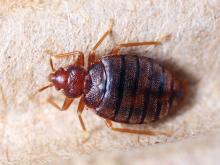Goodnight, sleep tight ...
File this under creepy-crawly things you never wanted to learn about but now you know. New research into cimicid fossils (a.k.a. bed bugs) shows that the blood-sucking parasites are as old as the dinosaurs.
Bed bugs have been on earth for 115 million years – approximately the same amount of time it takes to get rid of them from your home.
Bats have long been assumed to be the ancestral host of these horrific pests, but a bed bug fossil shows that they precede bats by nearly 30 million years. The idea of a bed bug “fossil” is a little suspicious to us over here at LOTME, though, because we are pretty positive bed bugs only multiply and never die.
The new research, published in Cell, confirmed that the bed bug species had a major split into the two most common forms millions of years before humans arrived. Also confirmed: Dinosaurs clearly slept in beds, and that’s where bed bugs came from.
Dog person? It’s in the genes
Are you a total dog lover? Would you totally risk a little infectious bug if you got to play with some pups? Turns out, your love for Fido might be predicted by your DNA.
An in-depth examination of the Swedish Twin Registry and national dog registers in Sweden found that genetic factors greatly contribute to dog ownership in Sweden. The study could not identify which genes are involved in our choices to keep dogs or if they related to evolution-related factors.
This is good news for dog people, though, because it suggests that if you love dogs, so does your family, and therefore you will be surrounded by dogs forever. At least that is what we’re choosing to believe.
This study could not be repeated with cat owners, because everyone knows cats own their humans, and the cats of Sweden were not interested in participating.
Gastroenterologists answer the big questions
Why does coffee make you poop? All coffee drinkers know this to be the case, and many even plan their mornings around it. But the real reason for this little side effect has always been a bit of a mystery.
Now, a group of researchers from the University of Texas may have an answer.
In a study presented at the annual Digestive Disease Week, the researchers fed coffee to rats for 3 days, analyzing their feces for changes in composition and bacterial make-up. (The joys of being a scientist.) They found that this diet suppressed the bacterial content of the feces; in addition, bacterial growth within the poop was suppressed when exposed to a 1.5% coffee solution on a petri dish.
An analysis of the rats’ intestines – dream job material right there – showed increased muscular motility. All of these effects occurred regardless of caffeine content.
And here’s a bonus: This was more than research just for research’s sake! The researchers claim that, given future study into the subject, coffee could be used as a treatment for ileus, a condition encountered after surgery where the intestines stop working. Apparently, it’s not just your brain that needs to be woken up – even your digestive system could use a coffee now and again.




